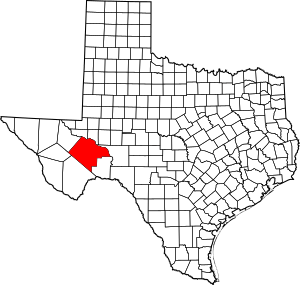Pecos County, Texas facts for kids
Quick facts for kids
Pecos County
|
|
|---|---|

Pecos County Courthouse in Fort Stockton
|
|

Location within the U.S. state of Texas
|
|
 Texas's location within the U.S. |
|
| Country | |
| State | |
| Founded | 1875 |
| Named for | Pecos River |
| Seat | Fort Stockton |
| Largest city | Fort Stockton |
| Area | |
| • Total | 4,765 sq mi (12,340 km2) |
| • Land | 4,764 sq mi (12,340 km2) |
| • Water | 1.0 sq mi (3 km2) 0.02%% |
| Population
(2020)
|
|
| • Total | 15,193 |
| • Density | 3.1885/sq mi (1.23107/km2) |
| Time zone | UTC−6 (Central) |
| • Summer (DST) | UTC−5 (CDT) |
| Congressional district | 23rd |
Pecos County is a large county located in the state of Texas. In 2020, about 15,193 people lived there. The main town and government center, called the county seat, is Fort Stockton.
Pecos County was officially created in 1871 and started operating in 1875. It is named after the Pecos River. This county is one of nine counties that make up the Trans-Pecos region in West Texas.
Contents
History of Pecos County
Early People and Finds
Long, long ago, people lived in the Pecos County area. Scientists have found old tools and items from hunter-gatherers at a place called Tunas Peak. These finds include stone circles that might have been tipi rings or wickiups, which are types of shelters.
One discovery was a "ring midden," which is a pile of old food scraps and tools. It showed that people lived there around 1300 AD. Other finds near Tunas Creek include a burial site and pictographs, which are ancient drawings on rocks.
Important Trails and Forts
Many important trails crossed Pecos County in the past. The Comanche Trail went through the area near a spot called Horsehead Crossing and Comanche Springs. Another trail, the Chihuahua Trail, connected Mexico with Santa Fe, New Mexico. Travelers used this trail around 1840, passing through Comanche Springs.
In 1858, the United States Army built an outpost called Fort Stockton at Comanche Springs. Its job was to protect the mail route between San Antonio and El Paso. Later that same year, the Butterfield Overland Mail service started using this army post.
How the County Grew
The town of Fort Stockton started near the army post. It was first called St. Gaul, Texas, but changed its name to Fort Stockton in 1880. The Texas Legislature officially created Pecos County in 1871. St. Gaul became the county seat.
Around 1,100 people lived in the county in 1871. By 1890, people were raising cattle and sheep. They also grew some corn. By 1900, raising cattle and sheep was the main way people made a living.
Around 1900, a small town called Sheffield appeared. It helped supply the nearby ranches. In 1913, the Kansas City, Mexico and Orient Railway was built across Pecos County. This brought more people and helped communities grow.
Irrigation projects along the Pecos River also helped the area. The town of Girvin grew around a train stop. It was a place where ranchers shipped their cattle.
Oil and Fun Characters
The discovery of the Yates Oil Field in 1927 brought a lot of money and jobs to Pecos County. Towns like Red Barn, Iraan, and Bakersfield grew because of the oil industry. Iraan's name comes from the names Ira and Ann Yates, who owned the land where oil was found. The county's population more than doubled in the 1920s because of the oil boom.
Iraan is proud to be the birthplace of the cartoon caveman Alley Oop. His creator, V.T. Hamlin, got the idea while working in the oil fields. You can visit the Alley Oop Museum in Iraan! Fort Stockton has a large statue of a roadrunner named Paisano Pete.
Geography of Pecos County
Pecos County is very large. It covers about 4,765 square miles. Only a tiny part of it is covered by water. It is the second-largest county in Texas by land area.
Yates Oil Field
Pecos County is home to one of the biggest oil fields in the United States, called the Yates Oil Field. It is in the eastern part of the county, near the Pecos River. This oil field covers about 41 square miles near the town of Iraan.
It was found in 1926 and has produced over a billion barrels of oil. Experts believe it still has more than another billion barrels that can be taken out. The Yates Oil Field was one of the first huge oil fields found in the Permian Basin.
Main Roads
 Interstate 10
Interstate 10 U.S. Highway 67
U.S. Highway 67 U.S. Highway 190
U.S. Highway 190 U.S. Highway 285
U.S. Highway 285 U.S. Highway 385
U.S. Highway 385 State Highway 18
State Highway 18 State Highway 290
State Highway 290 State Highway 349
State Highway 349
Neighboring Counties
Pecos County shares borders with these other counties:
- Ward County (north)
- Crane County (north)
- Crockett County (east)
- Terrell County (south)
- Brewster County (south)
- Jeff Davis County (west and south)
- Reeves County (northwest)
People of Pecos County
| Historical population | |||
|---|---|---|---|
| Census | Pop. | %± | |
| 1880 | 1,807 | — | |
| 1890 | 1,326 | −26.6% | |
| 1900 | 2,360 | 78.0% | |
| 1910 | 2,071 | −12.2% | |
| 1920 | 3,857 | 86.2% | |
| 1930 | 7,812 | 102.5% | |
| 1940 | 8,185 | 4.8% | |
| 1950 | 9,939 | 21.4% | |
| 1960 | 11,957 | 20.3% | |
| 1970 | 13,748 | 15.0% | |
| 1980 | 14,618 | 6.3% | |
| 1990 | 14,675 | 0.4% | |
| 2000 | 16,809 | 14.5% | |
| 2010 | 15,507 | −7.7% | |
| 2020 | 15,193 | −2.0% | |
| U.S. Decennial Census 1850–2010 2010–2014 |
|||
In 2020, there were 15,193 people living in Pecos County. About 71% of the people were Hispanic or Latino.
Education in Pecos County
Kids in Pecos County go to public schools run by three different school districts:
- Buena Vista ISD
- Fort Stockton ISD
- Iraan-Sheffield ISD
Williams Regional Technical Training Center
Pecos County also has a special training center called the Midland College/Williams Regional Technical Training Center. It's in Fort Stockton, right next to Interstate Highway 10. This center was built in 1996 to help people get more education and job skills in West Texas. It was named after Clayton Williams Jr., who was from Fort Stockton and helped donate to the center.
Communities in Pecos County
Cities
- Fort Stockton (the county seat)
- Iraan
Census-Designated Places
These are areas that are like towns but are not officially incorporated as cities:
Unincorporated Areas
These are smaller communities that are not part of any city:
Notable People from Pecos County
- Clayton W. Williams Sr. was an oilman and rancher. He served as a Pecos County commissioner for 16 years.
- His father, Oscar Waldo Williams, was a lawyer and served as a Pecos County judge for ten years.
- Clayton Williams Jr., who ran for governor of Texas in 1990, grew up in Fort Stockton.
Images for kids
See also
 In Spanish: Condado de Pecos para niños
In Spanish: Condado de Pecos para niños
 | Aaron Henry |
 | T. R. M. Howard |
 | Jesse Jackson |


